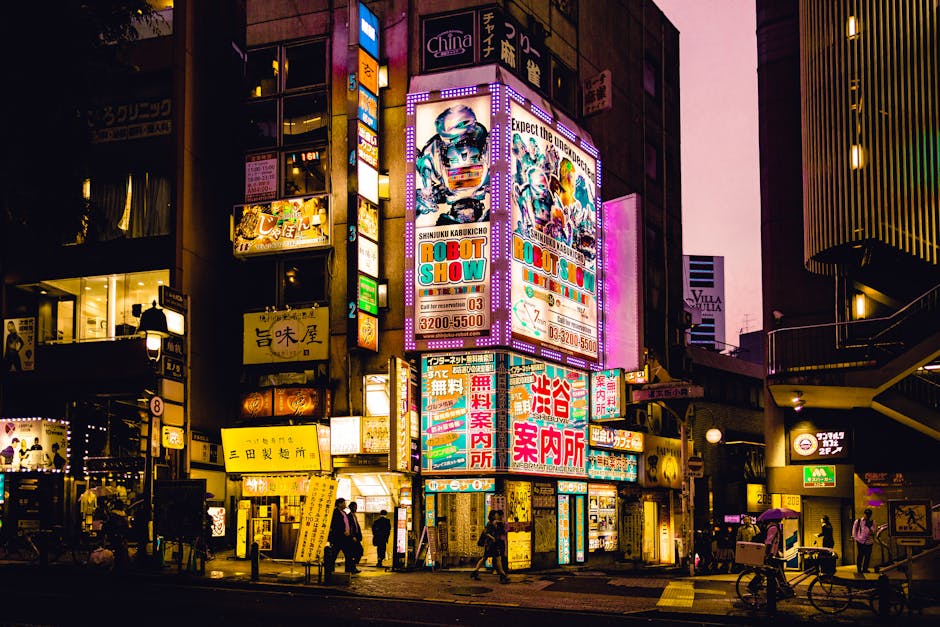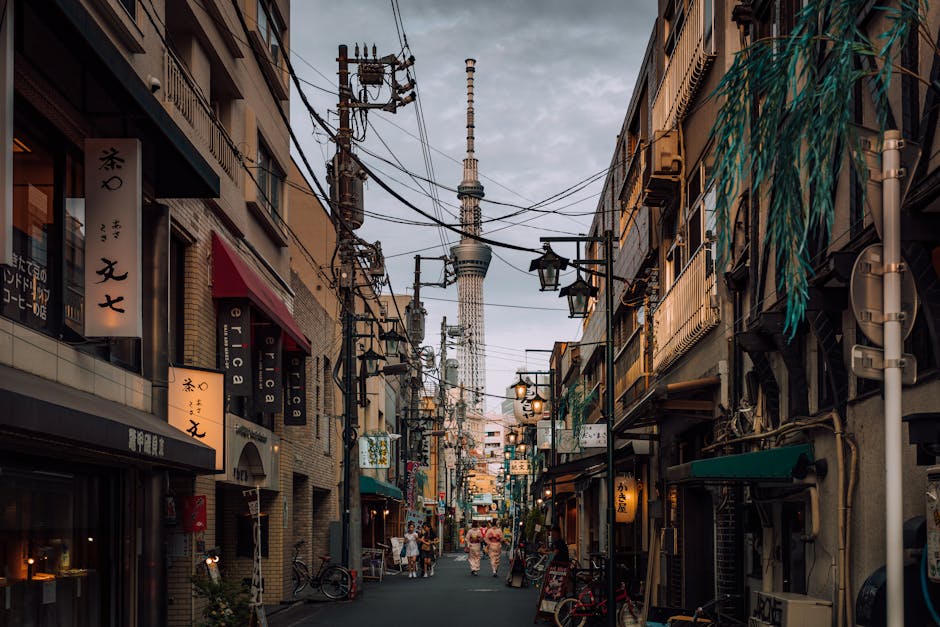Exploring Tokyo: A Blend of Tradition and Modernity

Tokyo, Japan's bustling capital, seamlessly blends its rich historical heritage with cutting-edge modernity. From ancient temples to towering skyscrapers, Tokyo is a city where tradition and innovation coexist harmoniously. This article will explore Tokyo’s vibrant culture, iconic landmarks, diverse neighborhoods, and culinary delights.
Rich Cultural Heritage
Tokyo’s cultural landscape is a testament to its long and storied history. One of the most iconic historical sites is the Senso-ji Temple, located in Asakusa. Founded in 645 AD, Senso-ji is Tokyo's oldest temple and attracts millions of visitors annually. The temple complex is adorned with traditional Japanese architecture and offers a glimpse into the country's spiritual heritage.
Adjacent to Senso-ji is Nakamise Shopping Street, a bustling avenue filled with shops selling traditional snacks, souvenirs, and crafts. Visitors can experience the charm of old Tokyo while sampling delicacies like ningyo-yaki (doll-shaped cakes) and senbei (rice crackers).
Another significant cultural site is the Meiji Shrine, dedicated to Emperor Meiji and Empress Shoken. Nestled within a lush forest in Shibuya, the shrine provides a serene escape from the urban hustle. Traditional wedding ceremonies are frequently held here, offering a unique insight into Japanese customs.
Modern Marvels
Tokyo's skyline is a testament to its status as a global economic powerhouse. The city boasts some of the world's most impressive modern architecture, including the Tokyo Skytree. Standing at 634 meters, it is the tallest structure in Japan and offers panoramic views of the city from its observation decks.
The Roppongi Hills complex is another marvel of modern urban design. It features a mix of offices, apartments, shops, restaurants, a museum, and an observation deck that provides stunning city views. The Mori Art Museum within Roppongi Hills showcases contemporary art from Japan and around the globe.
Shibuya Crossing, often dubbed the "world's busiest pedestrian crossing," epitomizes Tokyo's vibrant energy. Thousands of people cross simultaneously during peak times, creating an awe-inspiring spectacle. The nearby Shibuya Scramble Square offers additional observation points to witness this organized chaos from above.
Diverse Neighborhoods
Tokyo's neighborhoods each have their distinct personalities and attractions. Shinjuku is known for its nightlife and entertainment options. The district's neon-lit streets are home to countless bars, clubs, karaoke spots, and restaurants.
In contrast, Ginza represents Tokyo’s upscale side with luxury boutiques, high-end department stores, and gourmet dining options. It's an excellent place for those seeking retail therapy or indulging in fine cuisine.
Harajuku is synonymous with youth culture and fashion. Takeshita Street is lined with trendy shops selling unique clothing and accessories catering to various subcultures. Nearby Omotesando Avenue offers a more sophisticated shopping experience with designer brands housed in architecturally stunning buildings.
Culinary Delights
Tokyo’s food scene is renowned worldwide for its diversity and quality. The city boasts more Michelin-starred restaurants than any other in the world. Sushi aficionados can visit legendary establishments like Sukiyabashi Jiro or explore Tsukiji Outer Market for fresh seafood delicacies.
Ramen lovers will find countless options ranging from traditional shops to innovative eateries putting unique twists on this beloved dish. Ichiran Ramen is famous for its solo dining booths that allow patrons to focus entirely on their meal without distractions.
For those interested in street food, Ameya-Yokocho Market in Ueno offers various snacks such as yakitori (grilled chicken skewers), taiyaki (fish-shaped pastries), and takoyaki (octopus balls). The market’s lively atmosphere makes it an ideal spot for casual dining experiences.
| Neighborhood | Key Attractions |
|---|---|
| Asakusa | Senso-ji Temple, Nakamise Shopping Street |
| Shibuya | Shibuya Crossing, Shibuya Scramble Square |
| Ginza | Luxury shopping, gourmet dining |
| Harajuku | Takeshita Street, Omotesando Avenue |
| Ueno | Ameya-Yokocho Market |
The fusion of tradition and modernity makes Tokyo an unparalleled destination for travelers seeking diverse experiences within one city. From historical landmarks that echo Japan's past to futuristic skyscrapers symbolizing its forward-thinking spirit, Tokyo offers something for everyone.
The city’s neighborhoods provide distinct atmospheres catering to various interests—from fashion enthusiasts in Harajuku to food lovers exploring Ueno’s markets. Whether strolling through serene shrines or navigating busy intersections like Shibuya Crossing, visitors can immerse themselves in both the old-world charm and contemporary vibrancy that define Tokyo.
Top 5 Must-Visit Festivals in Tokyo
Tokyo is not just a city of historical landmarks and modern marvels; it is also a vibrant epicenter of cultural festivities. These festivals, known as "matsuri," offer visitors a unique opportunity to experience traditional Japanese culture, community spirit, and seasonal celebrations. Here are the top 5 must-visit festivals in Tokyo:
-
Sanja Matsuri
Held annually in May, Sanja Matsuri is one of Tokyo's most famous Shinto festivals. Taking place in Asakusa, it honors the three founders of Senso-ji Temple. The festival features dynamic parades with mikoshi (portable shrines), traditional music, and dance performances. The streets come alive with an electrifying atmosphere as locals and visitors join in the celebration.
-
Sumida River Fireworks Festival
This iconic summer event lights up the night sky over the Sumida River with thousands of fireworks. Held on the last Saturday of July, it attracts millions of spectators who gather along the riverbanks to enjoy the spectacular display. The festival has a history dating back to the Edo period and continues to be a highlight of Tokyo's summer events.
-
Kanda Matsuri
Taking place in mid-May, Kanda Matsuri is another grand Shinto festival celebrated at Kanda Myojin Shrine. It occurs biennially on odd-numbered years. The festival includes vibrant parades featuring mikoshi, samurai warriors, and traditional floats. It commemorates the victory of Tokugawa Ieyasu at the Battle of Sekigahara, which led to the establishment of the Tokugawa shogunate.
-
Tokyo International Film Festival (TIFF)
For film enthusiasts, the Tokyo International Film Festival is a must-attend event. Held annually in October, TIFF showcases a diverse range of films from around the world, including premieres and retrospectives. The festival also hosts panel discussions, workshops, and meet-and-greet sessions with filmmakers and actors.
-
Sakura (Cherry Blossom) Festivals
The arrival of cherry blossoms in late March to early April marks one of Japan's most beloved seasons. Various sakura festivals are held throughout Tokyo, with popular spots including Ueno Park, Shinjuku Gyoen, and Chidorigafuchi. These festivals feature hanami (flower viewing) parties where people gather under blooming cherry trees for picnics and celebrations.
These festivals offer a glimpse into Tokyo's rich cultural tapestry and provide unforgettable experiences for those who attend. Whether you're interested in traditional rituals or contemporary arts, Tokyo's festival calendar has something for everyone.
FAQ: Exploring Tokyo
Planning a trip to Tokyo can be overwhelming given the city's vast array of attractions and experiences. Here are some frequently asked questions to help you navigate your visit:
- What is the best time to visit Tokyo?
- How can I get around Tokyo?
- Is it expensive to eat out in Tokyo?
- What are some unique souvenirs to buy in Tokyo?
- Are there any etiquette tips I should be aware of?
The best time to visit Tokyo is during spring (March to May) when cherry blossoms are in full bloom or autumn (September to November) when the weather is mild and foliage colors are vibrant.
Tokyo has an extensive public transportation system that includes trains, subways, and buses. The JR Yamanote Line is particularly useful for tourists as it circles central Tokyo and connects major districts like Shibuya, Shinjuku, and Akihabara.
Tokyo offers a wide range of dining options suitable for all budgets. While there are many high-end restaurants, you can also find affordable eateries such as ramen shops, conveyor belt sushi restaurants, and izakayas (Japanese pubs).
Popular souvenirs include traditional crafts like folding fans (sensu), Japanese ceramics, kimono fabrics, specialty teas, and quirky items from shops in neighborhoods like Akihabara and Harajuku.
Yes, some key etiquette tips include bowing when greeting others, removing shoes before entering homes or certain establishments, avoiding loud conversations on public transport, and being mindful of personal space.
By keeping these FAQs in mind, you can ensure a smoother and more enjoyable experience as you explore everything that Tokyo has to offer.
